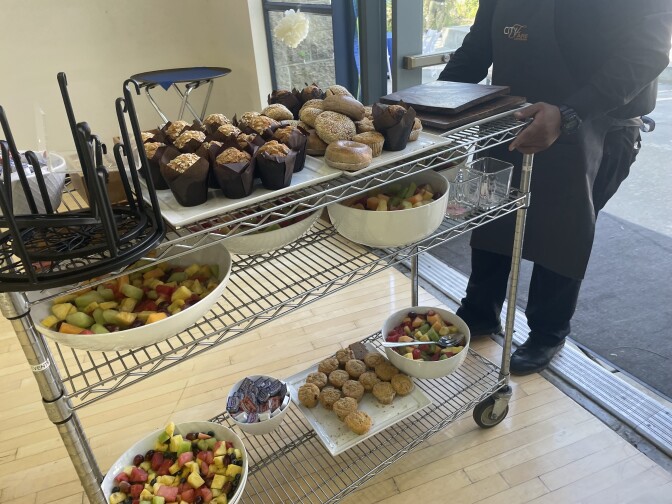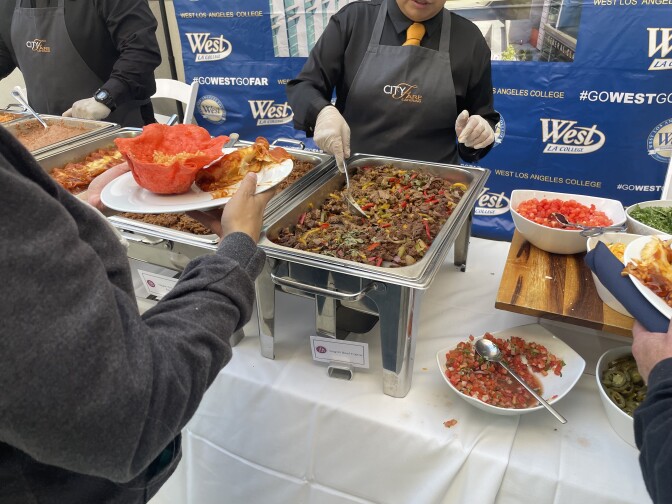This story is free to read because readers choose to support LAist. If you find value in independent local reporting, make a donation to power our newsroom today.
How A Conference About Climate Change Tackled Its Own Food Waste (But Didn't Skimp On The Coffee)

Wearing gloves past their wrists, Alekos Tetradis stood guard by a cluster of compost, recycling, and landfill bins. Around them, attendees at this West Los Angeles College climate conference mulled where to toss their trash. If someone went for the wrong bin, Tetradis, a WLAC biochemistry student, stooped, reached in with gusto, and righted the wrong.
“It can seem a little daunting to know what is and isn’t compost, but that’s why I’m here,” Tetradis said.
Tetradis was excited to volunteer for this work at the West Los Angeles’ Climate Careers Conference. The conference’s stated goal was to identify new curriculum and training programs to advance sustainability careers.
LAist’s goal was to watch the food line: Would it be any different from other conferences, with rows of boxed lunches that might get tossed? Would participants be given those red “delicious” apples only to then just throw them away? What does it take to “walk the sustainability walk” when you have to feed hundreds of people?
The plan to spend money
Tetradis stepped away to consult with another volunteer about the coffee cups, which seemed compostable — they looked brown and felt rough, as if made from recycled material. Tetradis and the volunteer determined the inside had a wax coating, so it would fall under recycling.
(Editor's note: After this story published, there was some discussion about whether a coffee cup with a wax coating is recyclable. Tetradis did note that it technically requires a special facility. These things are complicated.)
“We have to care to compost because if you're not thinking about the effects, if you're not thinking about honestly how easy it is to separate your trash before you throw it away, you just toss everything into one bin,” Tetradis said. “It's so much easier.”
Jo Tavares, the director of the California Center for Climate Change Education, said the planning committee began meeting several months in advance, “making sure that we were aligned with practices with the things that we're telling the world that we all need to change. Perhaps not overnight, but culturally speaking, right? Like a culture of reducing waste in general.”

For instance, the committee spent more on aluminum water bottles than plastic — at around $2 an aluminum bottle, four times more. Before the event, participants were also encouraged to bring reusable bottles.
“When you plan an event, you have a budget, and you have to make sure that you try — especially when you're using public money, which is our case — you have to try to minimize costs. But everything that we do has a hidden cost, right,” Tavares said.
For example: the pollution from a single-use plastic water bottle isn’t reflected in the consumer price of 50 cents. And the aluminum water bottles can be recycled.
The necessary provisions of calories and caffeine
Then there’s the first meal of the day: A breakfast of bagels, danishes, muffins, quick breads, cut fruit, and of course, coffee.
Coffee’s contention with sustainability includes the environmental cost of production, including substantial water use and other issues.
But, Tavares said, “we’re still in a situation that I cannot have a conference that starts at 8:30 a.m. and not offer coffee to the participants, right? It's something that culturally would be absolutely unacceptable."

Mid-morning, a cart carrying half-full bowls of cut fruit, muffins, and bagels made its exit. Research from the Pacific Coast Food Waste Commitment and World Wildlife Fund identified those items as among the most common kinds of food waste at events.
The committee decided to pay a local organization to manage the compostable waste and leftover food, which cost $2,000 spread over three days of events. There are composting centers available for drop-off, but Tavares said it made sense to pay another organization to manage the waste and leftovers.
“What is it that is important to you? What are these trade-offs that you're willing to do? And, you know, do they really need to be sacrifices all the time? Are there substitutions or new ways of looking at the way things ought to be?” Tavares said.
A lot of events stick with the tried and true.
“I’m looking at breakfast buffets and hotels — it’s sugar, it’s pastries, and things like that,” Tracy Stuckrath, a certified events planner, told LAist.
Struckrath works for thrive! meetings & events, which specializes in safe, sustainable, and inclusive dining. She also runs a podcast called Eating at a Meeting, and said she asked her audience what they wanted to eat for breakfast.
“They said they were looking for protein and you don’t get that on a continental breakfast,” said Stuckrath, who pointed out adding eggs, bacon, and sausage could add $20 per person.
Adding a lot of meat has other costs, too, though. But it’s still early; we’ll save that discussion for lunch.
The tedious but rewarding chore of sorting trash
According to the Environmental Protection Agency, food waste accounts for about 20% of municipal solid waste in U.S. landfills, but makes up nearly 60% of annual landfill methane emissions.
California has made it a requirement to divert organic waste from landfills and reduce methane emissions since the passage of SB 1383. By 2025, the state aims to reduce organic waste in landfills by 75% and redirect at least 20% of currently disposed edible food for people to eat.
To help sort through its own waste and minimize harm, the center conference relied on friendly student volunteers, like Tetradis.
Tetradis talked to LAist about “greenwashing,” how items may be marketed as plant-based, but in reality may be mixed with chemicals that ultimately renders them not compostable. They believe the labeling should be more transparent.
Examining the cutlery at today’s event, Tetradis found out what it was made of: “Oh, the forks are metal! Oh this is perfect.”
They would be washed and reused.
The perennial headache of the RSVP list
Not surprisingly, the best way to reduce food waste is to make less food to begin with.
Fabio Miranda’s locally based company City Fare catered the event. City Fare has been incorporating more compostable disposables and more vegan options, which he anticipates there will be increasing demand for. In theory, he said, catering for an event means preparing food for a set number of people, so there would be less waste than the uncertainty restaurants face.
With catering for events, however, “there’s always attrition,” Miranda said. “There’s always last minute no-shows even though individuals have RSVP’d, and that’s a little difficult to kind of gauge and estimate. How many people will be no-shows?”
He points out that no one hosting events wants to run out of food either.

Stuckrath, the events planner who specializes in sustainability, told LAist, “it really comes down to monitoring your attendee arrivals and departures schedules.”
There have been financial and cultural incentives for providing extra food, said Jackie Suggitt, director of capital, innovation and engagement at ReFED, a national nonprofit dedicated to ending food loss and waste. Vendors would need to compensate attendees if food runs out and event attendees “regardless of what we say about our sustainability preferences, we like the options, even if we’re the last one going through the buffet.”
Suggitt said one of the solutions their organization proposes from their own event planning experience and case studies is to actually underproduce. ReFED will produce food for 50% to 85% of the people registered for the event. (By day two of an event, “No one actually comes down for breakfast, they just want coffee,” she said.)
“I mean, that's hard, right? Like over the fear of running out of food. You may run out of one of your dishes and that happens. Right?” Suggitt said.
She observed this earth friendly mindset could be acceptable at a conference about food waste, but elsewhere “can be kind of a difficult norm to break away from.”
The environmentally conscious plant-based lunch
The climate conference lunch was a taco bar buffet spread with traditional fixings of rice, beans, tortillas, guacamole, salsa, and, among other items, plant-based beef fajitas.
Besides food waste in landfills, the raising of livestock also contributes significantly to U.S. greenhouse gas emissions.

Meat and plant-based preferences is something the organizer Tavares did wrestle with, worrying that students, particularly high school students attending this week’s events, may not eat the vegan options.
But Jade Allison, a conference participant, said the plant-based lunch menu showed the organizers are aligned in practice with their sustainable messages.
Some liked the plant-based meat. “I love rice and beans, and I like the Beyond Meat steak,” said Andrea Abrego, a West L.A. student who participated in an internship panel.
Ayman Sharafat, though, preferred a meat option. He's doing a fellowship in Texas with the Climate Action Network, but originally hails from Jordan. While the lunch was “delicious and healthy,” when asked how he would design the ideal conference lunch, he said, “some people like lamb, some people like pork, beef, and chicken.”
The necessary origin of the food
Seated at a round table, conference participant Beth Yirga chimed in to a conversation about the food’s origins and final destination.
“I want to know the history of my plate…I want every piece of my plate to be connected to a community that is doing this work to heal the planet," Yirga said. "And I'm, we're, supporting their efforts and nourishing our bodies at the same time.”
Mariela Bazán, chief sustainability officer for the Events Industry Council, a global organization that has established sustainable event standards, calls this “social procurement.”
Social procurement means “where are you purchasing from? Do you have a policy of sourcing from small and medium enterprises? Are you looking for diversity in your supply chain? Are you looking for fair labor, not child labor, in your supply chain?” Bazán said.
She said in the past, when considering sustainability, the events industry used to focus on materials like plastic water bottles and reducing waste, but over time, considering the climate impact of travel and social procurement has grown in importance. That means considering things like chocolate certifications, fair trade coffee, and other elements of sourcing (seafood, for example, can be notorious to track, but one can start the conversation by asking).
The final fate of the waste
Not all of this conference’s food would make its way onto people’s ceramic lunch plates.
“I think that is a hidden side of something like conference lunches and buffets that we don't really get to know,” said attendee Allison, who wanted to know what would happen to the leftovers. “Like a product’s life cycle and lifespan is much larger than it being on a plate in front of me. And I think, like, for sustainability, we have to shift our mindset to incorporate the full picture more often.”
CCCCE contracted the organization Compostable to bring the compost to partner farms and urban growing spaces within 10 miles of the event, and redistribute the leftovers to Free Food Collective, a local organization which delivers food to unhoused people in West L.A.

At the end of the day, Becca Scheuer from Compostable weighed the food waste and leftover food — approximately 60 pounds of food waste to become compost, about 80 pounds of leftover food to be redistributed.
“So that is great,” Scheuer said while loading up the pickup truck. “None of that is in the landfill.”












